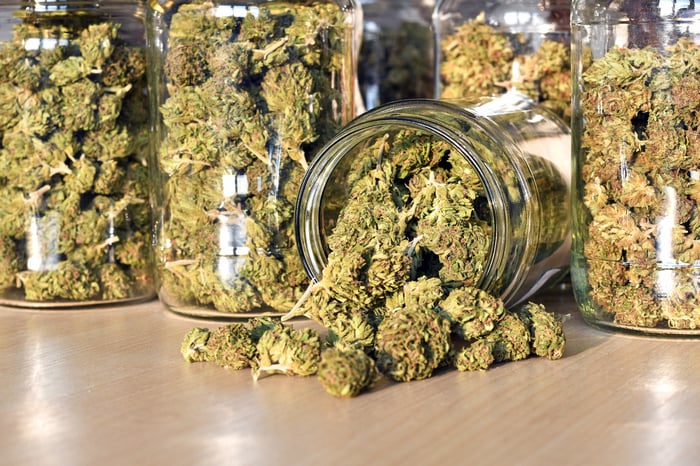Don't blink, because you might miss some of the big changes that are occurring in our neighbor to the north. Earlier this month, Canada's Senate voted in decisive fashion -- 56 votes in favor compared to 30 opposed -- for the Cannabis Act (officially, bill C-45). Though there's some ironing out to do with regard to added amendments, the Cannabis Act is likely to be signed into law very soon.
For the legal cannabis industry in Canada, this means adult-use weed sales could begin as soon as September or October, with the end goal being the addition of $5 billion or more in annual sales. These billions of dollars are what's behind growers' rapid capacity expansion, as well as the meteoric rise in marijuana stock prices since the beginning of 2016.

Image source: Getty Images.
Say goodbye to Cannabis Wheaton, and hello to Auxly Cannabis
Of course, that's not the only thing changing in the legal cannabis space. A little less than two weeks ago, the largest publicly traded marijuana royalty stock by market cap announced that it would no longer be calling itself "Cannabis Wheaton Income Corp." Instead, the company changed its name, effective June 8, to Auxly Cannabis Group (CBWTF -0.52%). Though the company's Toronto Venture Exchange ticker symbol changed from "CBW" to "XLY," Auxly's over-the-counter ticker symbol in the U.S. remains the same, "CBWTF."
Why the name change? Though the company's press release did not offer any explanation, I believe there were two possible reasons.
First, Auxly Cannabis Group's business model has changed a bit.
The company's purpose since inception has been to operate as a cannabis royalty and streaming company. Effectively, it seeks out growers of all sizes that want to expand their production capacity for dried cannabis, cannabidiol oil, or other cannabis-related products, but that don't have the financing to do so. Remember, banks have been generally unwilling to lend to the marijuana industry for fear of criminal and/or financial penalties. This is where Auxly steps in. It provides upfront capital that allows growers to expand their production or product lines.
In return, Auxly Cannabis received a fixed percentage of production from its licensed partners for a long period of time. Best of all, Auxly is able to purchase this percentage of production at a well-below market rate. It then turns around and sells this production at market rates, thusly pocketing the difference as profit.

Image source: Getty Images.
In May, Auxly Cannabis Group closed on two acquisitions, both of which are relatively small cannabis grow facilities. Its nearly $30 million purchase of Dosecann in Prince Edward Island, and its $11 million acquisition of Robinson's Cannabis in Nova Scotia, added 42,000-square-foot and 27,700-square-foot grow facilities to its portfolio, respectively. Now that it's not entirely a royalty and streaming company, perhaps a name change was in order.
The second reason I'd suggest the company changed its name is to emerge from Wheaton Precious Metals' shadow. Cannabis Wheaton was actually named after Wheaton Precious Metals, the company that's made the royalty and streaming model work so well in precious metals. Yet, Cannabis Wheaton struggled to make a name for itself while bearing the namesake of this precious-metal streaming giant. Changing its name should help it emerge as a unique business model in the eyes of investors.
Name change aside, Auxly's outlook remains the same
Still, changing a company's name is like putting a new paint job on a car; what's under the hood ultimately remains the same. For Auxly Cannabis Group, the benefits and risks that existed two weeks ago are still the same today.
In terms of benefits, Auxly may offer the highest internal rate of return of any marijuana stock, as well as the most predictable cash flow of the legal weed industry. With more than a dozen licensed production partners, Wall Street can, with some degree of certainty, forecast Auxly's sales and income each year.
Also, given the company's production diversity, both based on the number of deals it's forged, as well as based on its geographic footprint throughout Canada, production issues at a single grow partner aren't likely to wreck its top or bottom line. Investors in Auxly believe they're buying into a high-margin, predictable, long-term growth model, and the estimated 230,000 kilograms the company is expected to receive in 2019 helps to back up this thesis for optimists.

Image source: Getty Images.
Then again, Auxly Cannabis also suffers from an inability to benefit from economies of scale. Since the company purchases a percentage of yield from its production partners at a relatively fixed, below-market cost, Auxly's only means to reduce its average per-gram expenditures is through direct ownership in grow facilities. However, even with its recent purchases, it'll be difficult to significantly move the cost needle lower. This leaves the company particularly exposed to any significant downturn in dried cannabis prices on a per-gram basis.
The other concern, which is endemic throughout the entire industry, is share-based dilution. Auxly Cannabis has itself raised capital by means of bought-deal offerings. Essentially, the company is raising capital by selling common stock, then turning around and handing this capital to its production partners in return for a percentage of their crop yield. Each and every one of these bought-deal offerings is dilutive to existing shareholders, and it can have a negative impact on the company's ability to turn a meaningful per-share profit since there are more shares outstanding.
While showing plenty of promise and offering a unique way to tackle to legal cannabis trade, Auxly still has plenty of questions left to answer before it becomes a viable long-term investment opportunity.





